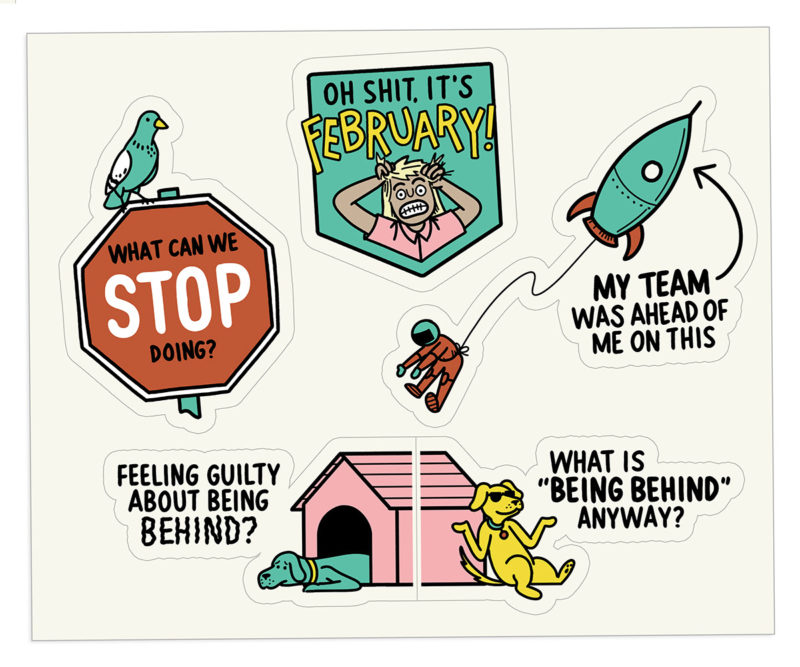Andy: Hey, how’s it going? It’s February.
Emma: Already!
Andy: I’ve found February can be a hard month at the office.
Emma: It’s a total scramble, mostly because it has the misfortune of coming right after January. I’ve always worked places where January ends up being a “strategy month,” even though, “obviously this all should have been mapped out back in October or November.”
Andy: And since February is so short, we’ve strategized ourselves out of more than ⅓ of Q1. Whoops!
Emma: I’m frustrated by this lack of thinking ahead, but I also don’t fight it. I’m pretty sure I would go out of my mind if I was trying to develop and kick off my team’s Q1 goals while also trying to keep the wheels on my operation through the holidays.
But that leaves me partway through the first week of February with the same feeling I get when I sleep through my alarm: a mix of panicked dread and heads-down hustle.
Andy: This is why they invented dry shampoo!
Your morning isn’t doomed, and neither is Q1. You have time to see where you’re at and figure out how to get it all done. It’s one part honest accounting, one part genuine curiosity to find your way forward — and the rest not throwing everyone around you into a frenzy because you suddenly realized the clock was ticking this whole time.
Emma: Seriously. Just because your head is suddenly in the game, don’t force-feed me your emotions.
Andy: Your team may already be ahead of you on this one.
Emma: When I feel behind, it feels like my fault, which makes me feel guilty, which makes me feel like I have to fix it on my own.
Andy: But when you’re a manager, your goals instantly become too big to accomplish on your own. It’s opposite of life as an individual contributor, when you could just buckle down and cram. You need help.
Emma: My deputies, my key people, can give me a realistic view of where the team is actually at. And as we work through the problem together, I’m looping them in on what needs to get done, and giving them some ownership of how we’re all going to get there.
Andy: And hey, wouldn’t you know: That’s one of the points of our Good Boss Scorecard! My team understands our goals and what it will take to achieve those goals.
Emma: Well done!

How to Get It All Done in Q1
Start by mapping out what needs to get done, and how long you normally budget.
Compare that to how much time is left before your deadlines hit. Do not be afraid if the first number is much bigger than the second number. Right now we’re in an imaginary place where time doesn’t exist. Time is just a number.
Then, share those numbers with your team.
Do it calmly and Socratically and maybe even with a little positivity. The message here is simply:
“This is what we’re shooting for by the end of March. Take a look and let me know how you’re doing against these goals. Are you looking good? What are your blockers?”
Shining light on what needs to get done may be enough to boost team productivity and make up for lost time.
If it’s not enough…
4 Questions to Ask Yourself + Your Team
1. If we keep doing things exactly as we’re doing them now, what’s seems impossible?
Approach this question with blameless inquiry, not like a trap. It will help you see what your constraints are and where you’re going to need to get creative. (Remember: dry shampoo!)
2. Is there anything we can stop doing?
You might remember this question from our newsletter about what to do when you’re doing too much. The same principles apply: List out all your team’s tasks, tally up the hours, and dump everything you don’t absolutely need. Any duplicate processes? Favors you’re doing for another department? Reports no one is reading? Office hours no one attends?
3. Is there anything we can do differently?
This is also known as Creative Problem Solving and it’s crucial to have lots of brains in on it. Can you streamline fiddly parts of a work flow? Expedite a new tool that will shave off time? Implement a hardware or software that will make something easier? It can help to write out your goal versus the end result you’re trying to achieve, too. Check out the difference between Audit every page on the site and Recommend strategy for existing content.
4. Can we get more hands on deck?
There’s a reason this question isn’t the first one: It’s easy to end up relying on it when there are smarter, cheaper, and less morale-draining ways to get work done. That said, it’s okay to ask for help. Is there another department that has some bandwidth? Would a short-term, mighty temp crew alleviate some stress? Look ahead to Q2: Should you hire more people?

Good Boss Achievement Stickers: It’s February Edition


